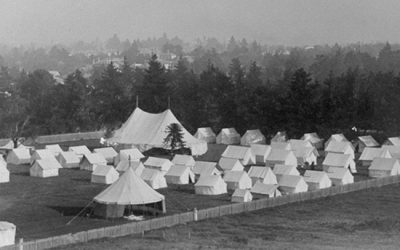In nearly every Seventh-day Adventist Church, the sermon is the focal point of the main service—similar to many Protestant Christian denominations. It is a time of biblical instruction by the pastor, who shares what they’ve been studying in the Bible and preparing over the previous week.
By its engaging stories, illustrations, and explanation of the Bible, the sermon is homily meant to help draw the congregation to a deeper walk with God (Romans 10:17).
Let’s learn more about how sermons work.
We’ll unpack this by addressing some common questions:
- What makes a sermon a sermon?
- What are the different types of sermons?
- What are Adventist sermons about?
- Where can I listen to Adventist sermons?
By the end, you’ll get the feel for how this part of an Adventist worship service fits into the whole experience.
What makes a sermon a sermon?

Photo by Mitchell Leach on Unsplash
A sermon is a religious speech often given during the main service of a church for the entire congregation. The sermons are usually preached by a pastor, though it’s not uncommon for them to be presented by church elders or other leaders. Sometimes members or youth even get a chance to preach for their church family.
This part of the worship service can last anywhere from 20-40 minutes, on average.
Those 40 minutes are meant to speak directly to the heart, giving us some insight that makes the words of the Bible applicable to our daily lives. The focus is not supposed to be on the speaker—but the message from God the speaker is sharing. Then the audience is encouraged to think about God’s will for them, and to study the Scripture for themselves.
How does the speaker accomplish this goal?
Rather than giving lots of information, the speaker focuses on a main point. He or she will draw a practical application from this point and, at the end, call the listeners to take action in their daily lives.
If you want an example of a sermon in the Bible, you can look at what’s called the “Sermon on the Mount,” when Jesus preached to thousands of people about how to apply God’s Word in their lives. It’s covered in Matthew chapters 5-7.
But not all sermons are exactly the same. There are different styles and types.
What are the different types of sermons?
Most sermons can be divided into three main categories: topical, exegetical, and biographical.
Topical sermons
Topical sermons cover a topic from the Bible, bringing Scripture passages from both the Old Testament and New Testament for a comprehensive overview. They can be doctrinal (e.g. the Second Coming, salvation, heaven) or non-doctrinal (e.g. faith, prayer, knowing God’s will). Sometimes, the speaker may focus on the way the Bible uses a particular word or phrase. The possibilities for sermon topics are limitless.
Exegetical sermons
Exegetical sermons look at a specific passage from the Bible. The purpose is to dig into it, explain it, and share contextual details. The speaker may provide the cultural and historical background to the passage or look at the underlying meanings of words. The goal is to bring out the underlying principle the text is conveying.
Exegetical sermons can be narrative or expository.
Narrative sermons focus on a story in the Bible, such as Jesus feeding the 5,000.
Expository sermons hone in on a more theological principle. An example of this would be a passage from Paul’s epistle to the Galatians, where he explains concepts about salvation instead of telling a story.
Biographical sermons
Biographical sermons go through the story of a character in the Bible, pinpointing the lessons we can learn from it. They can be either topical, involving texts from many places in the Bible, or exegetical, focusing on one key passage about that character.
What are Adventist sermons about?

Photo by Martin Schmidli on Unsplash
Like many Christian sermons, Adventist sermons vary in topic but find their foundation in Bible study. The preachers take seriously the counsel in 2 Timothy 4:2 to “preach the Word” (ESV).
Instead of being either fire-and-brimstone messages or fluffy affirmations, Adventist sermons strive to deal with relevant and practical topics from the Bible. They might also contain a prophetic element and a sense of urgency.
These principles come from Jesus Himself.
Jesus spoke the truth to His hearers, showing how it applied in their daily lives. He often used illustrations from familiar objects or occupations to relate to the people (a candle, the lost sheep, the lost coin).
But above all, He quoted Scripture and drove it home to people’s hearts, calling them to make decisions. Prophecy and the importance of readiness underlay His messages.1
Similarly, leaders in the New Testament church preached the Word of God (Acts 4:31; 5:42; 8:4). They referred to the prophecies and stories of the Old Testament to point to Jesus (Acts 13:6–41).
Then, the Holy Spirit used the messages to convict people’s hearts and lead them to God (Acts 2:37).
Adventist sermons follow the model of Jesus and the New Testament church leaders as they empower the audience to seek God.
What makes Adventist sermons different from other sermons?
Like Christian preachers of other denominations, Adventist preachers want to help their listeners learn more about the Bible and grow closer to God. They seek to make Jesus central to their message. But Adventist sermons have some differences too, namely their approach to the Bible and their underlying themes.
Though sermons in other denominations also draw from the Bible’s teachings, Adventist preachers make it a specific goal to make sure the whole Bible shapes their messages. Instead of picking out a single verse and using it to make a point, they look at what the whole Bible says on a topic.
Second, certain themes are common for Adventist sermons that are specifically connected to their beliefs, such as:
- the various aspects of Jesus’ ministry (His life, death, resurrection, and priestly role in the heavenly sanctuary)
- the church’s (body of Christ’s) prophetic mission
- the three angels’ messages of Revelation 14
- The seventh-day Sabbath
- Jesus’ soon coming
(To learn more about these themes, read about the unique mission of the Adventist Church. )
Where can I listen to Adventist sermons?
To hear a sermon in person, visit your local Adventist Church. You can find their service times by checking out their website or Facebook page. If you’re not feeling ready to attend a service, you can catch a live streamed sermon instead.
Online church sermons are also within your reach at some key websites and YouTube accounts. Check these ones out:
Sermons drive us to a deeper relationship with God
We all have the privilege of seeking God for ourselves through prayer and Bible study. But God also uses dedicated people, such as pastors and church leaders, to help us know Him better. Their diligent Bible study and the Holy Spirit’s conviction bring us new insights, hope, and a fresh perspective of the love of God.
The sermon is the part of the church service structure that allows that to take place. Through it, we gain practical wisdom to live out God’s mission for our lives.
Excited to listen to a sermon? Find an Adventist Church near you and stop in one Sabbath. We’d love to have you!
Find a Church
If you’re interested in finding a local Adventist church near you, you can use the Adventist Locator provided by the General Conference of Seventh-day Adventists.
Related Articles
- Find some of Jesus’ sermons in Matthew 5–7, 13, 24, and John 6. [↵]
More Answers
Seventh-day Adventist World Population and Demographics
The Adventist Church has more than 22 million members and 100,000 churches worldwide, plus a large system of hospitals, schools, and publishing houses. Learn more about this diverse church.
What Is a Seventh-day Adventist Camp Meeting?
Although camp meetings didn’t begin with the Seventh-day Adventist Church, they’re as much an Adventist thing as haystacks.
Camp meeting is an extended event for Adventists (and non-Adventists) of all ages to gather and participate in spiritual seminars and activities. During the event, attendees often camp in tents, campers, or RVs.
How to Join the Seventh-day Adventist Church
Whether you heard about the Seventh-day Adventist Church through a traveling evangelist, during your online searches, or through a loved one or relative, you might be considering joining yourself.
How Do Adventists Do Baby Dedications?
For Christians, dedication ceremonies for babies, also for older children, are an important time for parents and the church. It’s a special part of the worship service when parents present their young children to God and the church family. Both parents, along with the congregation, regard this as a solemn promise to be a Christ-like example to the child.
Do Adventists Celebrate Communion and Foot Washing?
Like many Christian denominations, Adventists regularly participate in communion, also referred to as the “Lord’s Supper” or the “Last Supper.” They also practice foot washing (John 13:1-20), or the “ordinance of humility,” during the service—which isn’t as common.
What is the Concept of “Present Truth” and Why is it Important?
Present truth is the principle that certain biblical truths are relevant to God’s people at specific times in history. God sends the Holy Spirit to reveal truths that help us better understand how to interpret and apply His Word in a present moment.
Do Seventh-day Adventists Celebrate Easter
Yes, many Seventh-day Adventists do celebrate Easter.
Does the Adventist Church Have Youth Ministry Programs?
The Seventh-day Adventist Church has been organizing and operating youth ministry programs since 1879.
In our opinion, youth ministry is one of the most important ministries a church can have.
Do Adventists Celebrate Birthdays?
Yes, most Seventh-day Adventists do celebrate birthdays because we see them as excellent reminders of the life God has blessed us with. And we celebrate them the same way everyone else does—with friends, family, presents, and a special meal.
What Do Adventists Offer for Young Adults?
In recent years, the age group often classified as “young adults” has been trickier to engage. It’s been a significant concern for Christian churches around the world. Though interestingly enough, similar observations regarding young adults have been coming up in conversations about the economy, the entertainment industry, politics, and more.
Do I Need to be an Adventist to be Saved?
The answer to this question is simply, “no.”
When it comes to salvation in Jesus Christ, all that is required of a person is to acknowledge Jesus’ sacrifice for us, believe that He has saved us, and claim the free gift of salvation that is always available to us. Salvation is not based on denomination.
Do You Have to Be Vegetarian to Be Adventist?
Of course not. Membership in the Seventh-day Adventist Church has never included any dietary requirements. However, there might be some reasons people might think that. So many Adventists are vegetarians or even vegan, and a plant-based lifestyle has many health benefits.
All About Seventh-day Adventist Colporteurs
The Seventh-day Adventist Church uses a variety of methods to spread the hope of the gospel to the world. One of these ways is through colporteuring, also called “canvassing” or “literature evangelism.”
What Is an Adventist Book Center (ABC)?
When you walk into any one of the many Adventist Book Center (ABC) locations, chances are you’ll be greeted by pleasant gospel music in the background, friendly employees, and row after row of Christian books, movies, Bibles, study guides, kids’ games, and more.
Do Seventh-day Adventists Celebrate Holidays?
Wondering whether your Adventist classmate or coworker keeps the same holidays you do? Perhaps you want to include them in some festivities, but you also want to respect their beliefs. Thus, you’re unsure of how to navigate the holiday question. Will they accept your invitation to the office Christmas party?
The Adventist Haystack (It’s Not What You Think) + 4 Recipes
Haystacks are basically a taco salad—with an Adventist spin on it! Most versions are vegetarian and offer an endless combination of tasty toppings. We eat them often because they’re healthy, scrumptious, and easy to make.
Do Seventh-day Adventists Believe in Medical Care?
The Seventh-day Adventist Church believes in and supports evidence-based medical care. In fact, medicine has played a significant part in our history, and today we run a major health system with hospitals, medical schools, and clinics throughout the world.
All about Adventist Elementary Schools
The Seventh-day Adventist Church operates the largest Protestant education system in the world. A big part of this system is our K-8 elementary schools, or primary schools, as they’re known in other parts of the world.
What Are Pathfinder and Adventurer Clubs?
Like the boy or girl scouts, Pathfinders and Adventurers learn about nature and life skills. But what makes these clubs special is their purpose to bring young people closer to Jesus.
A Look at Adventist Colleges and Universities
On the outside, Seventh-day Adventist universities may not look much different than other college campuses. But the real differences are beneath the surface.
What Is ASI (Adventist-Laymen’s Services and Industries)?
ASI, which stands for Adventist-laymen’s Services and Industries, is a membership-based organization that provides support for Seventh-day Adventist laypeople (Adventist professionals who aren’t pastors).
What Are Adventist Evangelistic Meetings?
The Seventh-day Adventist Church puts a huge emphasis on sharing the gospel through evangelism, or sharing the gospel through preaching, teaching, and testimony. One of the ways we accomplish this is by organizing public events called evangelistic meetings.
Christian Summer Camps—A Cherished Adventist Ministry
School’s out, the sun’s shining, and your kids are thrilled to have the summer ahead of them. Then three days in, you hear, “I’m bored…”
Do Adventists Have Their Own Bible?
Adventists have some unique beliefs—you might be able to name some of them right now. The seventh-day Sabbath. Death as a sleep. Hell as nonexistence.
What Is Vespers?
Friday rolls around, and you’re spending time with your Adventist friends or relatives when they mention they’re going to vespers tonight.
Adventist Pastors
What is the role of a pastor in the Adventist Church? The position itself, at least as far as a local congregation is concerned, is not much different from that of pastors in other protestant denominations.
The Leadership Structure of the Seventh-day Adventist Church
The Seventh-day Adventist Church has a representative form of structure that connects its 90,000-plus congregations across the globe and gives its members a part in decision-making. Though the Church was incorporated in 1863, this system came about during the church’s reorganization from 1901 to 1903. It includes four levels of organization.
What to Expect When You Go to an Adventist Church
If you’re attending an Adventist church for the first time, you may wonder what it’s really like. While each Adventist church is unique in its collective personality and local culture, Adventist church services are generally similar to most other Protestant church services.
Adventist Education
Seventh-day Adventists have historically upheld the importance of a well-rounded, high-quality education. Instead of a one-size-fits-all approach to teaching and learning, the Adventist Education system operates on the principle of educating the “whole” person.
Didn’t find your answer? Ask us!
We understand your concern of having questions but not knowing who to ask—we’ve felt it ourselves. When you’re ready to learn more about Adventists, send us a question! We know a thing or two about Adventists.


































